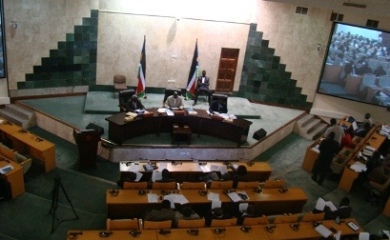Journalist assaulted, humiliated at S. Sudan parliament
February 06, 2012 (JUBA) – A renowned journalist was humiliated and beaten by security guards manning South Sudan’s National Assembly on Monday, eye witnesses told Sudan Tribune.
 Mading Ngor, host of the popular ‘Wake Up Juba’ show on Bakhita FM, was roughed up by at least four security men and wrestled to the ground in front of other journalists. Only when a MP intervened was he let go by the security services.
Mading Ngor, host of the popular ‘Wake Up Juba’ show on Bakhita FM, was roughed up by at least four security men and wrestled to the ground in front of other journalists. Only when a MP intervened was he let go by the security services.
“What I encountered today was really embarrassing to the media as [a] profession,” a crest-fallen Ngor told Sudan Tribune on Monday evening.
“I entered the chamber of the assembly, got out my recorder and started recording proceedings. Moments later, an unidentified man walks up to me, asks why I was seated there and I explained to him. He could not listen to me. Instead he ordered four security officials to throw me out of the assembly,” he narrated.
Ngor, according to journalists who witnessed the incident, offered very little resistance while the security services tore apart his clothes and nearly destroyed his equipment.
“He was manhandled by the security guys who tore his trousers to the extent of nearly exposing his underpants to the public,” said a journalist who witnessed the scuffle in South Sudan’s Parliament.
Ngor attempted to explain that he was legally allowed to record at the National Assembly but his protests fell on deaf ears.
A group of journalists later visited the office of the information chairperson in the assembly to express their grievances. They also brought up the urgency of a long-awaited media law still before the legislative arm of government. In seven years of self-rule South Sudan has not created clear rules on the conduct of the media and press freedom.
While addressing the visibly angry scribes, Joy Kwaje, the parliamentary chairperson for information said she deeply regretted the manner in which the security officials mishandled the Bakhita radio journalist and promised to further take up the matter.
Lately, the relationship between the assembly and the media fraternity has been fraught. In December last year, a group of journalists who convened to cover a debate on insecurity in Juba, the South Sudanese capital, were kicked out of the assembly on orders of the deputy speaker, Daniel Awet Akot.
Another reporter was in 2008 manhandled by a lawmaker in the assembly corridors after the latter accused the journalist of allegedly defaming him in a newspaper article.
Some sections of the media have called for a media black out of the national assembly in solidarity with their colleagues who have been mistreated.
“How can we refer to ourselves as the fourth estate of government, if another arm of government [legislature] cannot accord respect to us. We should give the national assembly a real media blackout,” an angry member of the South Sudan Union of Journalist (SSUJ) told Sudan Tribune on Monday.
(ST)
